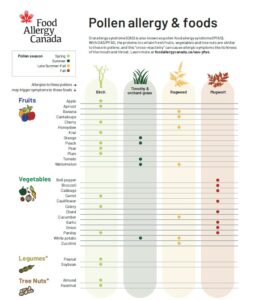Sign up for our May webinar on clinical trials with Dr. Julia Upton. Register your child for our next session of Allergy Pals/Allies and get ready for Food Allergy Awareness Month (FAAM) in May! Plus, with Spring in the air, so are pollens – learn more about pollen food allergy syndrome (also known as oral allergy syndrome) and how to manage if you’re impacted.
Webinar May 16th: The ins and outs of clinical trials

Join us to hear from Dr. Julia Upton to learn about the role of clinical trials and how they work in providing treatment options for food allergy. Register now and ask your questions in advance of the session.
What the webinar is about: What clinical trials for food allergy treatment are all about, including why they are important, what they involve, the different stages of a trial, when patients get involved, and things to consider if you are participating in one.
Who is presenting: Dr. Julia Upton, who is on staff at the Hospital for Sick Children in the Immunology and Allergy Department; Medical Director, Clinical Research Centre at SickKids Research Institute; and an Associate Professor in the Department of Paediatrics at the University of Toronto. She is on the Board of Directors at the Canadian Society of Allergy and Clinical Immunology and a member of our Healthcare Advisory Board.
When is it: Thursday, May 16th from 12pm-1pm EDT
Register now: Allergy Pals/Allies spring session
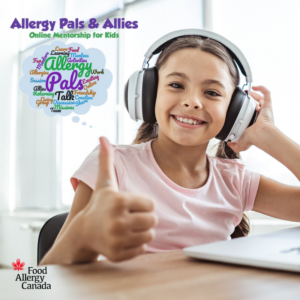
Our free 8-week online mentorship program begins on April 27, 2024! Sign up your 7-15-year-old now, so they don’t miss out on an amazing experience connecting with other children with food allergy.
These online sessions are fun, engaging and have received outstanding feedback from previous participants. Register your child today to save their spot!
Food Allergy Awareness Month is only a few weeks away!

May is Food Allergy Awareness Month (FAAM) in Canada, so stay tuned for exciting FAAM news and events, including teal monument lightings, educational webinars, campaigns, and more!
Our focus will be on building confidence around signs and symptoms and the treatment of anaphylaxis. Be on the lookout for an email on May 1st with more details on how you can participate throughout the month.
Managing springtime with pollen food allergy syndrome (PFAS)
Spring is in the air and so are many pollens causing those with PFAS (also known as oral allergy syndrome or OAS) to feel allergic symptoms, like an itchy mouth, itchy and watery eyes, sneezing, and more.
With PFAS, the proteins in certain fresh fruits, vegetables, and tree nuts are similar to those in pollens, and this “cross-reactivity” can cause allergic symptoms like itchiness of the mouth and throat. People with PFAS are allergic to pollen.
Symptoms
The symptoms of PFAS are usually itchiness of the mouth and throat when eating fresh fruits or vegetables and/or tree nuts related to the pollen to which you are allergic. Occasionally, swelling of the lips, tongue, mouth, or throat can occur. Examples of some of the fruits, vegetables and nuts that are similar to certain pollens are listed in our pollen allergy & foods chart.
Symptoms typically develop within a few minutes of eating. Although it is uncommon, PFAS can lead to anaphylaxis. PFAS symptoms can occur at any time of the year, but symptoms may be worse during pollen seasons.
Diagnosis
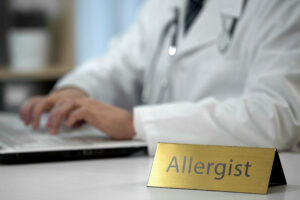
Allergists can review a patient’s history and may perform different tests to confirm PFAS, such as skin prick tests to certain pollens as well as the foods causing the symptoms. If you think that you or you child may have PFAS, a referral to an allergist can help you obtain a formal diagnosis.
Managing

Usually, people with PFAS avoid the fresh or raw food causing symptoms. They can often tolerate the food if it is well cooked or heated because preparing the food with heat changes the protein composition of it. Canned foods can also be an option, and some find that peeling the impacting fruit or vegetable is helpful.
It is not necessary to avoid all foods that can cross-react if they can be eaten without symptoms. Plus, symptoms can be very specific to certain types of fruits and vegetables. For example, some may only react to one apple variety and not to another.
In cases where there may be a higher risk of anaphylaxis, an allergist may recommend that you avoid certain food and carry an epinephrine auto-injector. These risk factors include involving more than a little itching in the mouth/throat, symptoms to tree nuts, and/or positive skin prick tests to the allergy extracts.
Treating

Treatment of this condition varies. Many people manage by avoiding the foods causing symptoms or consuming modified versions of the foods. Some people take antihistamines to relieve mild symptoms. It is not clear if receiving allergy shots (immunotherapy) for pollen allergy is helpful for PFAS.
Please speak to your doctor for treatment options that are best suitable to you.
Learn more
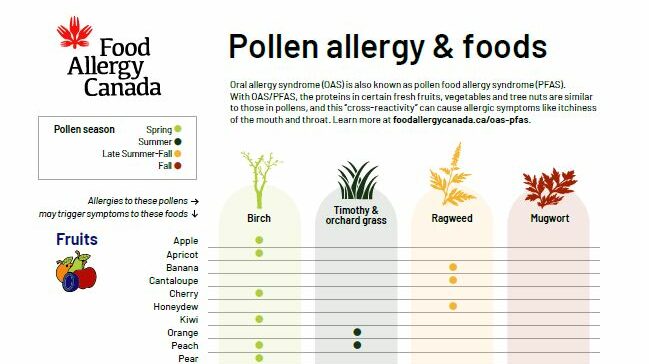 Pollen allergy and foods chart
Pollen allergy and foods chartThis handy chart shows the pollens broken out by the different seasons and which foods may trigger symptoms if you have PFAS.
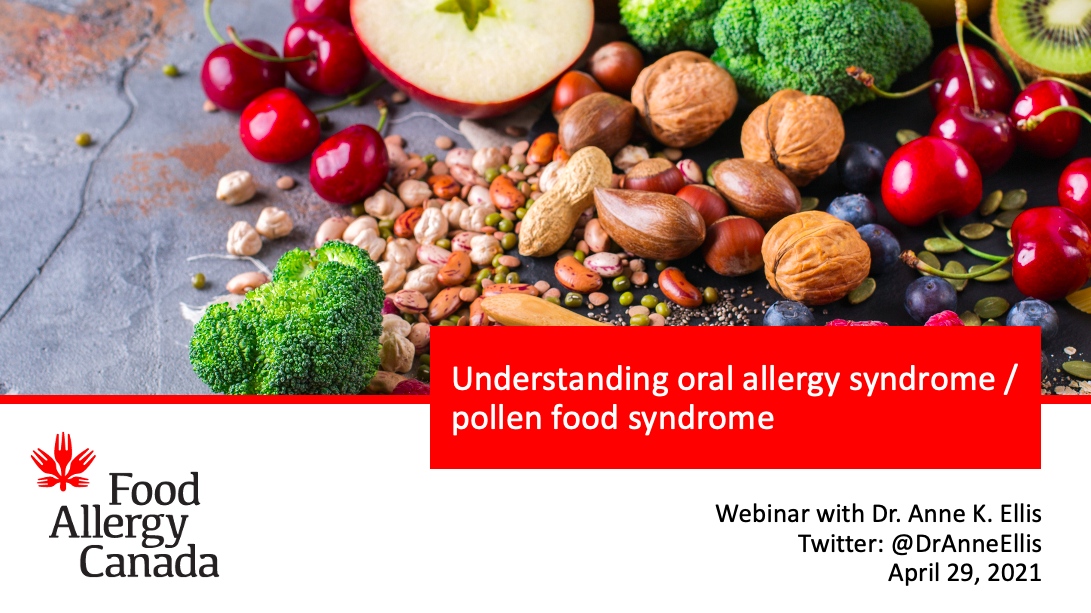 Understanding PFAS webinar
Understanding PFAS webinar Learn about the basics of PFAS, including symptoms, diagnosis and treatment, reactions and their severity, and how to manage it.
Tags: Clinical trials, OAS, PFAS, pollen food allergy syndrome, webinar

